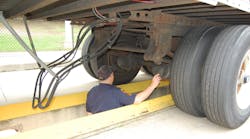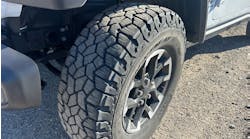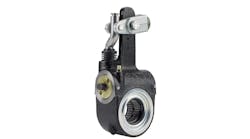CVSA Brake Safety Week starts Aug. 21. Are you prepared?
The Commercial Vehicle Safety Alliance (CVSA) has announced August 21-27 as the dates for this year’s Brake Safety Week. Brake Safety Week is an annual commercial motor vehicle brake-safety inspection, enforcement, and education initiative conducted by law enforcement jurisdictions in Canada, Mexico, and the U.S. During Brake Safety Week, inspectors will conduct their usual North American Standard Level I and V Inspections and capture and report brake-related data to CVSA. The results will be released in the fall.
Brake-related violations comprise the largest percentage of all out-of-service vehicle violations cited during roadside inspections, and according to last year’s three-day International Roadcheck data, brake systems and brake adjustment violations accounted for 38.9% of all vehicle out-of-service violations, the most of any category of vehicle violations. To address this, CVSA’s Brake Safety Week seeks to:
- Identify and remove commercial motor vehicles with critical vehicle inspection violation items identified in the North American Standard Out-of-Service Criteria from roadways.
- Conduct inspections and identify and acknowledge commercial motor vehicles that do not have critical vehicle inspection violations by affixing those vehicles with a CVSA decal.
- Encourage proactive vehicle maintenance in advance of the week.
- Highlight the hard work and commitment to safety by inspectors, drivers, and motor carriers.
- Remind drivers and motor carriers about the importance of proper brake maintenance and vehicle pre-trip and post-trip inspections.
- Provide an opportunity for outreach and educational brake-safety efforts by inspectors.
During the brake portion of a vehicle inspection, inspectors will look for missing, non-functioning, loose, contaminated, or cracked parts on the brake system, and non-manufactured holes (such as rust holes and holes created by rubbing or friction) and broken springs in the spring brake housing section of the parking brake. They will listen for audible air leaks around brake components and lines and ensure the air system maintains air pressure between 90-100 psi (620-690 kPa). Inspectors will also check for S-cam flip-over and measure pushrod travel. They will check that slack adjusters are the same length (from center of S-cam to center of clevis pin) and the air chambers on each axle are the same size. They will also inspect required brake-system warning devices, such as ABS malfunction lamp(s) and low air-pressure warning devices. In addition, inspectors will ensure the breakaway system is operable on the trailer, and inspect the tractor protection system, including the bleed-back system on the trailer.
In addition to reporting total inspections and brake-related out-of-service violations, inspectors will also capture and provide data on brake hose/tubing chafing violations—the focus area for this year’s Brake Safety Week.
“Poorly maintained brake systems can reduce the braking capacity and stopping distance of large trucks and motorcoaches, which poses a serious risk to driver and public safety,” said CVSA President Capt. John Broers with the South Dakota Highway Patrol. “In those split-second emergency situations, the proper functionality of the brake systems on large commercial motor vehicles is crucial.”
Preparation materials
Click here to view last year’s Brake Safety Week results.
Inspections
Roadside inspections: A necessary evil. Out-of-service rates in some areas are at a stagnant high, but a little prep can go a long way to help fleets and truck drivers avoid red-flag events and unplanned downtime on the road.
Passing a roadside inspection starts before the truck hits the road. Pre-trip and post-trip inspections, along with preventive maintenance, can go a long way to keeping freight moving and drivers in service.
CVSA Brake Safety Day results: 12% out of service. During the unannounced inspection day, CVSA-certified inspectors focused on the vehicle’s brake systems and components, and removed commercial motor vehicles with brake-related out-of-service violations from roadways.
CVSA 2021 Out-of-Service Criteria. Updated pass-fail criteria for inspections, which replaces all previous versions, available in multiple formats.
Bendix shares tips on preparing for Brake Safety Week 2020. Inspection and enforcement programs like Brake Safety Week demonstrate the significant value of regular brake system maintenance for all fleets.
Why truck inspectors devote full week to improving brake safety. As CVSA’s Brake Safety Week approaches, stay up to date on the latest statistics on brake safety and how to pass inspection this August.
Maintenance
Pre-inspection brake cleaning enhances fleet safety, uptime. Emphasizing the correlation between routine brake maintenance and national brake safety, Penray’s chief chemist breaks down the traits fleet maintenance managers and technicians look for in brake and parts cleaners.
Breaking down heavy-duty air brake maintenance. The integration of sensory technologies and other design improvements are giving technicians some assistance in the bay, but nothing can replace well-executed brake system PMs.
The ABCs of ADBs. Understanding the benefits, maintenance aspects, and specification options of air disc brakes.
Friction fit, form, and function. Understanding all aspects involved in spec’ing, maintaining, and monitoring brake lining material can lead to maximizing performance and uptime.




